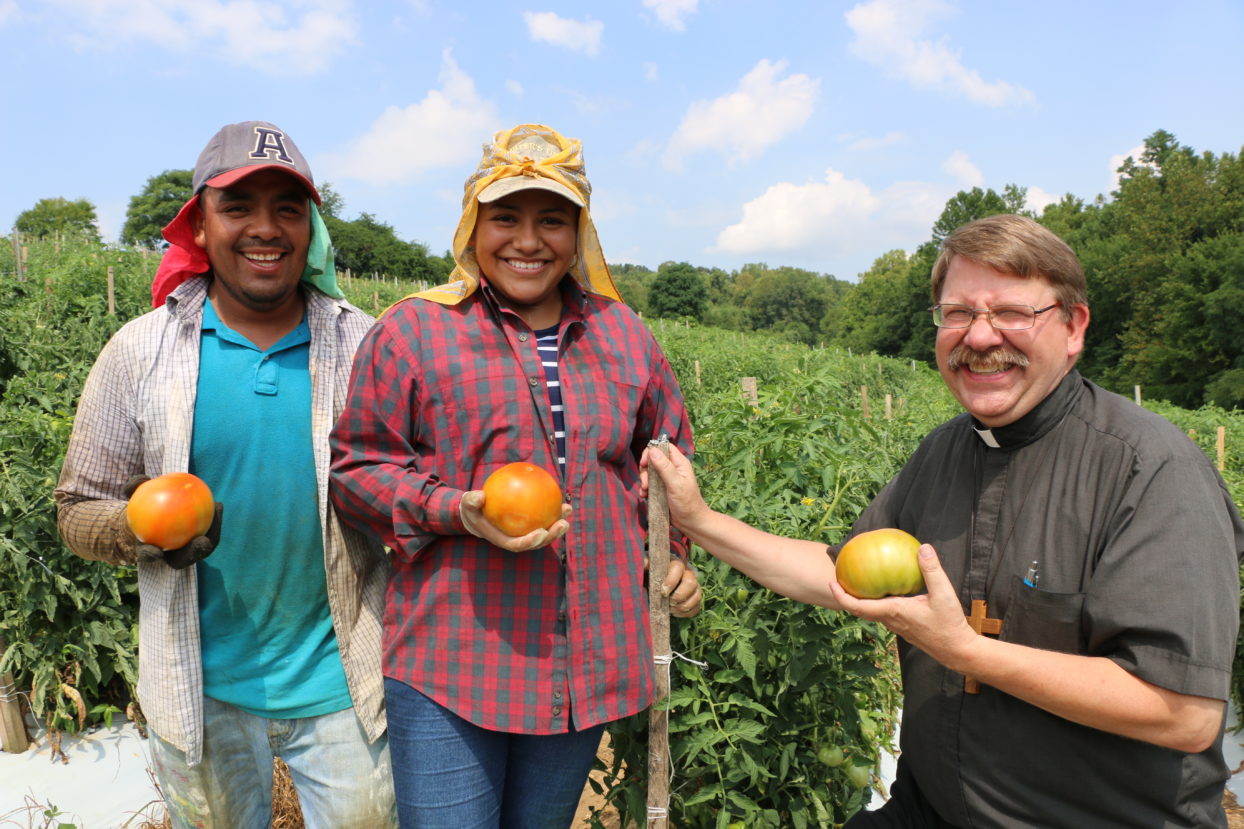With work of human hands, Santana family farm carefully cultivates fruit of the vine
By Jim Wogan
I couldn’t have chosen a more challenging day to watch someone pick tomatoes.
It was July 27, 2016, and the temperature in Grainger County hovered at around 96 degrees. Yes, that Grainger County — where home-grown and carefully cultivated tomatoes have gained a brilliant reputation for taste and texture from coast to coast, if not beyond.
While I personally prefer, and quite like, warm weather, I also prefer to work where the air is conditioned, and where my shirt can remain perspiration free. Don’t get me wrong, I’ve done physical labor in less-than-ideal conditions, mostly in college. But plodding along ripening rows of tomato plants on a dusty hillside in East Tennessee in late July challenged my definition of hard work, success, and faith.
However, the Santana family showed me the way.
Guadalupe Santana came to the United States from Mexico with virtually nothing except ambition. His eight-acre farm located in Rutledge is now well known to the “locals” who live nearby. The land is mostly for crops, but it also has room for a small family home, a barn where Mr. Santana can sell produce and maintain equipment, and three greenhouses.
When Lupe Santana first arrived in Grainger County in 2002 with his wife Reyna, he and other Central American immigrants picked tomatoes and other vegetables to earn a living. The Santanas did this for almost 10 years.
As time passed, their family grew. Some of their children also picked vegetables. A few years ago, when the former farm owner decided to sell his property, Mr. Santana said a neighbor helped negotiate an agreement allowing the Santanas to rent with an option to purchase. In 2011, Mr. Santana began the process to become the owner/operator of Santana Produce.
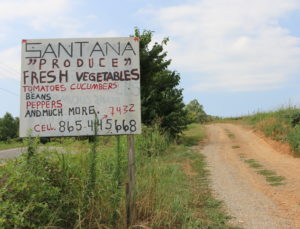
The Santanas advertise their fresh produce on a sign next to their farm that catches passing traffic on Lakeshore Drive near Cherokee Lake in Grainger County.
A sign for the farm sits just off Lakeshore Drive, barely a stone’s throw from Cherokee Lake. A short dirt road leads visitors past the crops and uphill to the family’s home and an aluminum-sided barn that sits nearby. Inside the barn, fans run at full speed to keep visitors cool and the flies away.
“When we first started there were some concerns. We knew how to do the planting, but we also had to do the selling, and that was new (for us),” Mrs. Santana said through an interpreter.
“It is a lot of work, work, work. It is always a lot of work, and sometimes at night you don’t sleep well. Do we have the right chemicals? Are the plants going to grow? Are things going to be right? Are we going to have enough customers? But with a lot of strength, and a lot of hope, and a lot of work, it has been going good.”
The Santanas are defining their with other commercially successful operations in Grainger County, Santana Produce is small. While some of the other farms sell to supermarket chains, the Santanas have survived by selling their produce at farmers markets, and to locals who stop by to purchase directly from the fields.
Baskets of thick, red tomatoes are displayed in their barn in July. During our visit, at least two different customers, Anglos, not Hispanics, arrived to buy produce.
While Mr. Santana’s children are grown and married (Lupe and Reyna now have six grandchildren), his daughter, Beatrice Juarez, a U.S. citizen, and son-in-law, Armando Juarez, worked together in the fields until recently.
Beatrice announced last summer that she was pregnant. She gave birth to the couple’s first child,
Emma, on March 28.
“When you work with family, besides being together, everyone has confidence. Everyone understands the business, and everyone understands the goals, so you don’t have conflicts about pay or when to get paid or who gets paid. You are together, everyone knows what they are doing and everyone benefits as a family,”
Mr. Santana said.
”For me, it’s important because I can have my plants, my family, and I feel better because my family helps me to work, and we can make all this work with everybody. I feel better because I have my family here because we can do more.”
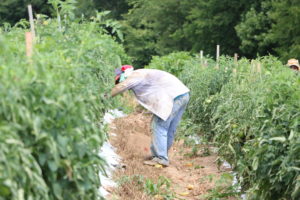
Armando and Beatrice Juarez inspect tomato plants on their family farm in Grainger
County for produce ready to be sold to the public.
The Santanas’ arrival in Grainger County actually predates the Catholic Church there. Mr. Santana grew up Catholic in Mexico and was aware of the faith, but according to Father Steve Pawelk, GHM, pastor of St. John
Paul II Catholic Mission in Rutledge, participation in the Church wasn’t central to Lupe’s life. With no Catholic church in Grainger County, being active in their faith was challenging at best.
Before 2011, Masses were occasionally offered during the harvest season. Priests from the Diocese of Knoxville would visit Rutledge to celebrate Mass at the agriculture center.
Six years ago, at the invitation of Bishop Richard F. Stika, the Glenmary Home Missioners arrived. In November 2011, Father Pawelk, a Glenmary priest, celebrated the first regular weekend Mass in Grainger County.
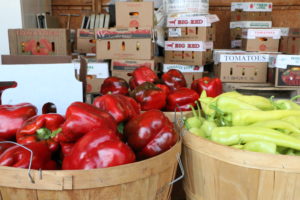
The Santana family farm also grows peppers,
beans, cucumbers, and other produce in addition to their Grainger County tomatoes.
The Santanas were among 26 Latino families to attend. Father Pawelk said it was “BYOC, as in, bring your own chair.” Father Pawelk described the altar as a dining room table and the presider’s chair was purchased at a garage sale two days before Mass was celebrated.
Since then, the Catholic Church has grown and become an important bond for the immigrant families that live and work in the Rutledge area. Masses in Spanish and English are now celebrated at St. John Paul II Catholic Mission, located in a small strip mall just off Rutledge Pike in the center of town.
The St. John Paul II community has grown to the point where it someday hopes to build its own church — on land recently purchased in Rutledge.
“They knew of each other but now they have formed a sense of community. They have formed a sense of support. They no longer see each other as competitors, who is going to get the better job or work at the bigger farm? There is more helping each other,” Father Pawelk said.
“There was no need to interact if you didn’t work for the same people or if they weren’t your blood relative… One of them recently was able to purchase his first home, and different members of the (church) took turns helping him build his extension. Soon, they will be a family of four, so the home was not big enough, so they worked together. That could have never happened five years ago because he wouldn’t have known anyone besides his immediate family. So that’s one of the great gifts (of this church),” he added.
A few years ago, Mr. Santana received first Holy Communion.
“I was able to make my first Communion, and with that sacrament I am much more closer to God. I am very grateful for the opportunity for my faith to grow here. God exists. God is true and God exists,” Mr. Santana said.
“When we first came here, it was just working and picking tomatoes. That’s what we did. We worked for someone else and we worked, and we worked, and you didn’t feel like you had time for God or other things,” Mrs. Santana said.
“When the Church started here, we became very involved and now I can’t see how I managed without my faith. The family is better, there are fewer problems. It just makes a grand difference in how we live, and how we work, and how we think. We sometimes might fall, but we know we can get up again, and be strong. It is just very, very important. It is more and more and more important in our lives.”
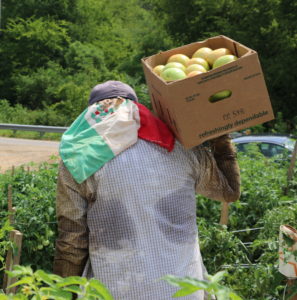
Armando Juarez carries some of the just-picked produce, which will be readied for sale to
customers.
Being faithful doesn’t make work in the fields easy. With their heads covered to protect them from the summer sun, Beatrice, husband Armando, and two other Santana Produce employees walked along rows of tomato plants looking for ripening fruit. For a visitor, the sign of ripened tomatoes isn’t always obvious. They’re still green, with just a slight hint of color change.
For the pickers, consideration is given to color, size, and quality before the fruit is hand-harvested. Once picked, the tomatoes are placed into cardboard boxes, hand-carried along the long rows of plants, and eventually loaded onto the bed of a small truck.
Farming for the Santanas is a year-round business. Tomatoes are planted and harvested three to four times a year. The family also grows cucumbers, squash, beans, peppers, watermelons, and cantaloupes. During the winter, the Santanas spend their days maintaining equipment and preparing the plants for seeding in their three greenhouses.
They started small and have now grown their business into self-sufficiency. They hope their story is one that offers an example for others— that hard work is good and necessary, and that faith keeps the family going.
“I am not worried about the future because I feel like I have a good relationship with the people here. They come, they like our products. I know my family, and I work hard, and we produce a good product. I really don’t have any worries about the future. We are doing fine. You always want more money, but we are OK. … Faith lets you keep going, and without that I don’t think I would have as much peace and confidence with (the) challenges that are before me,” Mr. Santana said.

